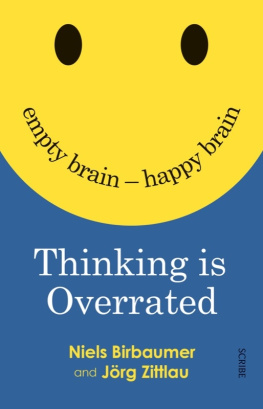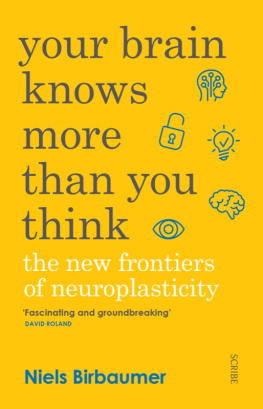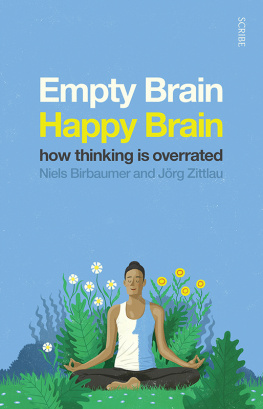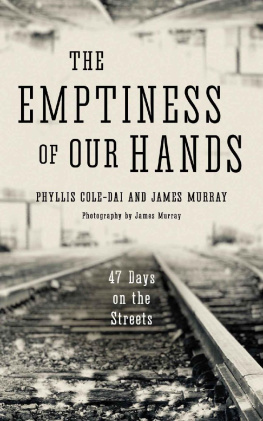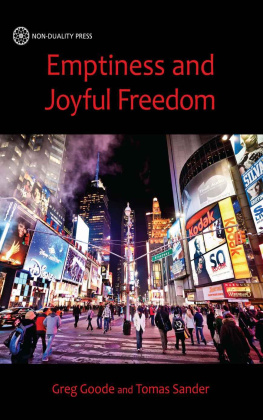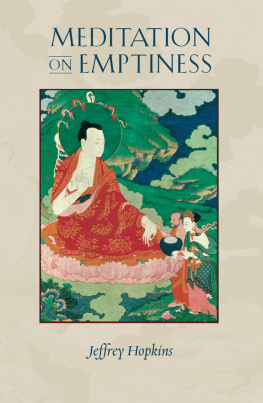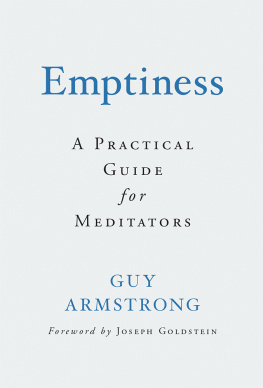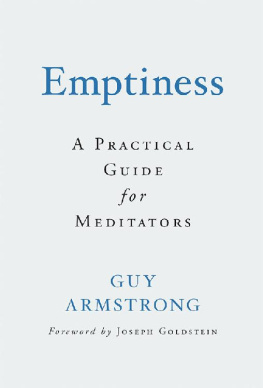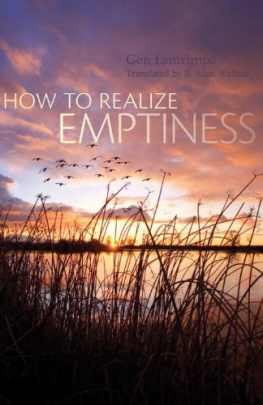Thinking is Overrated
Niels Birbaumer is a psychologist and neurobiologist. He is a leading figure in the development of braincomputer interfaces, a field he has researched for 40 years, with a focus on treating brain disturbances. He has been awarded numerous international honours and prizes, including the Gottfried Wilhelm Leibniz Prize and the Albert Einstein World Award of Science. Professor Birbaumer is co-director of the Institute of Behavioural Neurobiology at the University of Tbingen in Germany, and senior researcher at the Wyss Centre for Bio- and Neuro-engineering in Switzerland.
Jrg Zittlau is a freelance journalist, and writes about science, psychology, and philosophy, among other topics. He is also the author of several bestsellers.

Scribe Publications
1820 Edward St, Brunswick, Victoria 3056, Australia
2 John Street, Clerkenwell, London, WC1N 2ES, United Kingdom
Originally published as Denken wird berschtzt in German by Ullstein in 2016
First published in English by Scribe in 2017
by Ullstein Buchverlage GmbH, Berlin. Published in 2016 by Ullstein Verlag
Translation copyright David Shaw 2018
Illustrations copyright Peter Palm 2016
All rights reserved. Without limiting the rights under copyright reserved above, no part of this publication may be reproduced, stored in or introduced into a retrieval system, or transmitted, in any form or by any means (electronic, mechanical, photocopying, recording or otherwise) without the prior written permission of the publishers of this book.
The moral rights of the authors and translator have been asserted.
9781925322507 (Australian paperback)
9781911344582 (UK paperback)
9781925548624 (e-book)
CiP records for this title are available from the National Library of Australia and the British Library.
scribepublications.com.au
scribepublications.co.uk
Contents
Introduction:
how we have banished emptiness from our lives
philosophers as pioneers of emptiness
the brainwaves of emptiness
the brain areas of emptiness
the brain on autopilot
what happens to us when nothing happens
why is a mouse when it spins
what sex, religion, and epilepsy have in common
how music carries us away
how we should deal with diseases of emptiness
the happiness of locked-in syndrome
how emptiness will return to us at last
Introduction
A Parachute Jump into Emptiness
I was green around the gills. Only minutes earlier, I had been chattering away happily with a more or less healthy hue to my complexion as I boarded the plane with a plan to demonstrate how our wireless technology for measuring heart and sweat-gland activity works under unusual conditions. But now, here I was, just about to jump out of the plane, with only a parachute to save me, and I had taken on the colour of a vampire whos been snacking on the wrong blood group. Later, this will even be recognisable on photos of the event.
My mouth was so dry that my tongue stuck to the roof of my mouth; my knees were so weak, they were trembling as I staggered towards the hatch. There was not a word to be heard from me now, not a peep. I would never have managed to put together a sensible sentence, anyway, as my mind was racing, without contributing anything constructive to the situation.
My friend, the brain scientist and musician Valentino Braitenberg, described the brain as a thought pump, continually drawing things up from the deep. Right now, my pump was just about to go into hyperactive collapse, unable to draw anything but snatches of thoughts up from the depths, like a shipwrecked sailor trying desperately to bail out her leaking lifeboat with an empty yoghurt pot.
Then, finally, I jumped. I suspect someone must have pushed me, but I have no recollection of it now. Just as I have generally very little memory of anything from the moment I jumped to the moment I landed. Suddenly, the panic within me disappeared. The carrousel of thoughts in my head stopped spinning and I was simply falling, with the sky above and the slowly approaching forests below me.
It was a moment of rapture my self no longer seemed to exist. The fear I had felt before jumping was gone, and it was not replaced by a new fear, because there was nothing I could do anyway. Our wireless-technology project was certainly no longer of any concern to me, and all my other day-to-day worries were swept up into the sky by the wind that was thundering in my ears. Ive heard of mountaineers seeing their whole life flash before them as they plummet from the heights. But for me there was: nothing. Just emptiness.
The world was still there, but the borders between it and me became blurred. The others who jumped with me later told me I let out a yell for several seconds as I was falling, the like of which they had never heard emanating from me. I cant remember it. I dont even remember my parachute opening. All I can remember is landing, which in my case involved the branches of a tree and a few light injuries because I forgot to steer. And I remember my deep disappointment at the fact that it was over. I felt as if I had awoken from a wonderful dream but could not remember what made it so beautiful.
I have not done another parachute jump since. Not out of fear of the fall itself, which was appeased by that first jump. My fear is a different one. It is namely the fear that plummeting into the depths will never be as wonderful as it was the first time: so wonderfully empty .
What remains when we no longer think or feel?
Brain scientists dont usually have much truck with emptiness. Their work revolves around behaviours, thoughts, and emotions their inadequacies, and also their potential.
We now know that our brain is an organ of enormous plasticity. It is always able to keep learning and adapting from our early youth to our old age. Infants grow up speaking two languages with no problem at all, old people can learn to juggle or play a musical instrument even in extreme old age, criminals can become useful members of society, and, contrariwise, successful business executives can become desperate criminals. The possibilities are many both desirable and undesirable and include the ability to cope with crisis situations. It is a constant source of amazement the way traumatised children, maltreated concentration-camp survivors, and victims of war somehow manage to lead fulfilled lives again. Other people, by contrast, fall into despair at nothing more tragic than a lost football match.
In all these cases, problem-solving thinking is what is required and our thought pump begins working at full power. This not only brings us the realisation that the world exists, but also makes us realise that we exist in that world. Ren Descartes summed this up in his famous phrase: cogito ergo sum I think, therefore I am . Everything may be uncertain and in doubt, but the fact remains that it is I who am thinking those doubts; and in the first instance, that sounds comforting.
In another way, however, it also sounds worrying, since it raises the question: what remains of us when we no longer think or feel anything? Are we then nothing? Must we fear sinking into a sea of emptiness and eventually dissolving away?
In our daily lives at least, that fear does not appear to play an important role. We find it almost unbearable when the television breaks down or the internet is cut off, or when we have nothing to do or no one to be with. In a survey of young men and women, a third of the respondents said they would rather go without sex than their smartphone if they were marooned on a desert island. Other surveys have shown that peoples fear of boredom is similar to their fear of cancer. Almost as if to say: better to be fatally ill than empty. Yet another study found that healthy volunteers with no masochistic tendencies would rather give themselves harmless but unpleasant electric shocks than sit and wait for 15 minutes (see Chapter 1).
Next page
